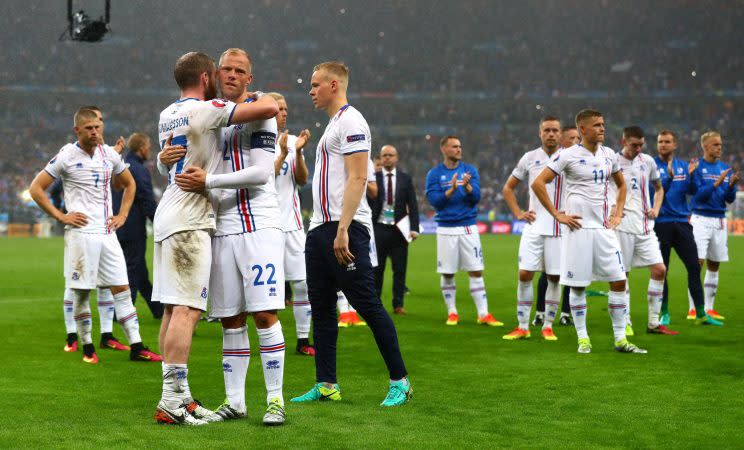How Iceland became the greatest underdog story in international soccer

When a beautiful dream ends, the awakening is always rude. Reality intrudes. The natural order is restored.
The clock has struck midnight and the golden carriage is a pumpkin again. The handsome prince has come through, but the glass slipper didn’t fit Cinderella’s foot after all. The Icelandic run at Euro 2016 is over, savagely killed off by the host country in a merciless quarterfinal beating at the Stade de France.
[ EURO 2016 | Predictions | Scores/Schedule | Standings | Teams ]
The dismantling was surgical. Iceland never had a chance. Before a quarter of an hour was up, Blaise Matuidi had picked out Olivier Giroud’s run with a perfect ball over the top, and the perpetually beleaguered Arsenal striker half-volleyed it through the legs of goalkeeper Hannes Halldorsson.
Then Paul Pogba smashed in a rocket header on Antoine Griezmann’s delivery. Giroud knocked down Bacary Sagna’s cross for Griezmann, who laid off for Dimitri Payet, and Payet placed his low shot from the edge of the box perfectly. And then Griezmann was sent away and scored with a splendid flicked lob that made it four. All before halftime.
Never mind that Iceland won the second half 2-1. Kolbeinn Sigthorsson poked in Gylfi Sigurdsson’s cross 10 minutes after the intermission, but not five minutes later Giroud had headed on a long ball to make it five. Birkir Bjarnason’s late header to cut the margin to 5-2 was scant consolation.
Faced with the might of the French national team, one of the deepest sides in the world, if not the very deepest, the Strákarnir okkar (“Our boys”) finally stumbled. Iceland – which made it through a brutal qualifying group with the Netherlands, Czech Republic and Turkey to reach their first major tournament ever – tied Portugal and Hungary in the group stage, beat Austria with a 94th-minute winner and then came from behind and upset supposedly mighty England in the Round of 16.
One of the countries with the world’s fewest citizens, one of the most sparsely populated places around, was the flavor of a European Championship that was supposed to be about the giants like Spain and Germany. But the Spanish didn’t reach as far as the Icelandic team and the Germans didn’t capture the imagination in the way the team managed by co-head coaches Lars Lagerback and Heimir Hallgrimsson did, composed from just 100 Icelandic fully professional soccer players. Their spirit and fight was inspiring. What they lacked in talent and experience and fame they compensated for with a clever game plan that was well-executed. The team’s appeal was its purity of a sporting story.
With its stupendously effective youth system, Iceland made the most of its population of merely 330,000, almost a tenth of which would show up for some of its games in France. It reinforced once again the notion that the correlation between a country’s population and its ability to construct a successful national soccer team is thin. Uruguay, with a population estimated at 3.3 million in 2013, has won two World Cups and made deep runs in several more. The Netherlands, population 17 million, has reached three World Cup finals overall and three semifinals in the last five editions. Belgium, population 11 million, has one of the most talented teams in the world. Wales, population 3 million, is in the semifinals against Portugal, population 10.4 million.
Iceland, in many ways, has outdone all of those underdog stories. Because unlike all of the above countries, it had no history of soccer success whatsoever. And it had such an unhelpful climate that it made any such thing seem impossible. But it decided, as a nation, that it was going to get better at soccer by training elite coaches and making indoor fields available to any kid who wanted to play year-round.
In so doing, and in thriving the way they did in France, the Icelanders made a mockery of more established nations who didn’t get as far. And of the idea that only the traditional powers can compete at major soccer tournaments.
After their elimination, there was just one thing left to do. To go to their enormous section of fans in the corner of the stands. And, like after every game in this tournament, to raise their arms high and wide, before clapping in unison. Again and again, a little faster each time, grunting with each clap.
The players looked disappointed and defeated. This time around, the traditional cheer was begun by their fans, rather than orchestrated by the players. The boys – their boys – eventually joined in. And together, they might have begun to garner some small understanding for the magnitude of all they had achieved in the last few weeks.
Iceland players all doing the thunderclap with their fans, huge cheer at the end pic.twitter.com/YSGQzvyH8A
— Miguel Delaney (@MiguelDelaney) July 3, 2016
Well done #ICE, something to be proud of!! pic.twitter.com/faKGGzMWaI
— 8bit-Football.com (@8bitfootball) July 3, 2016
they still don't want to go home pic.twitter.com/KNnrWOpXL8
— Ken Early (@kenearlys) July 3, 2016



